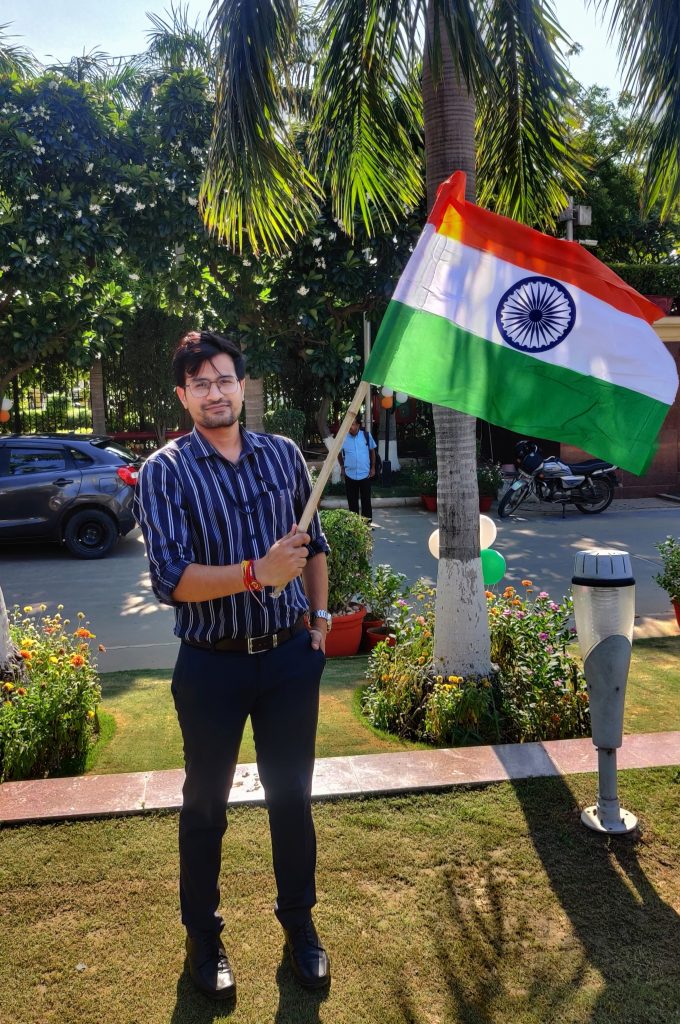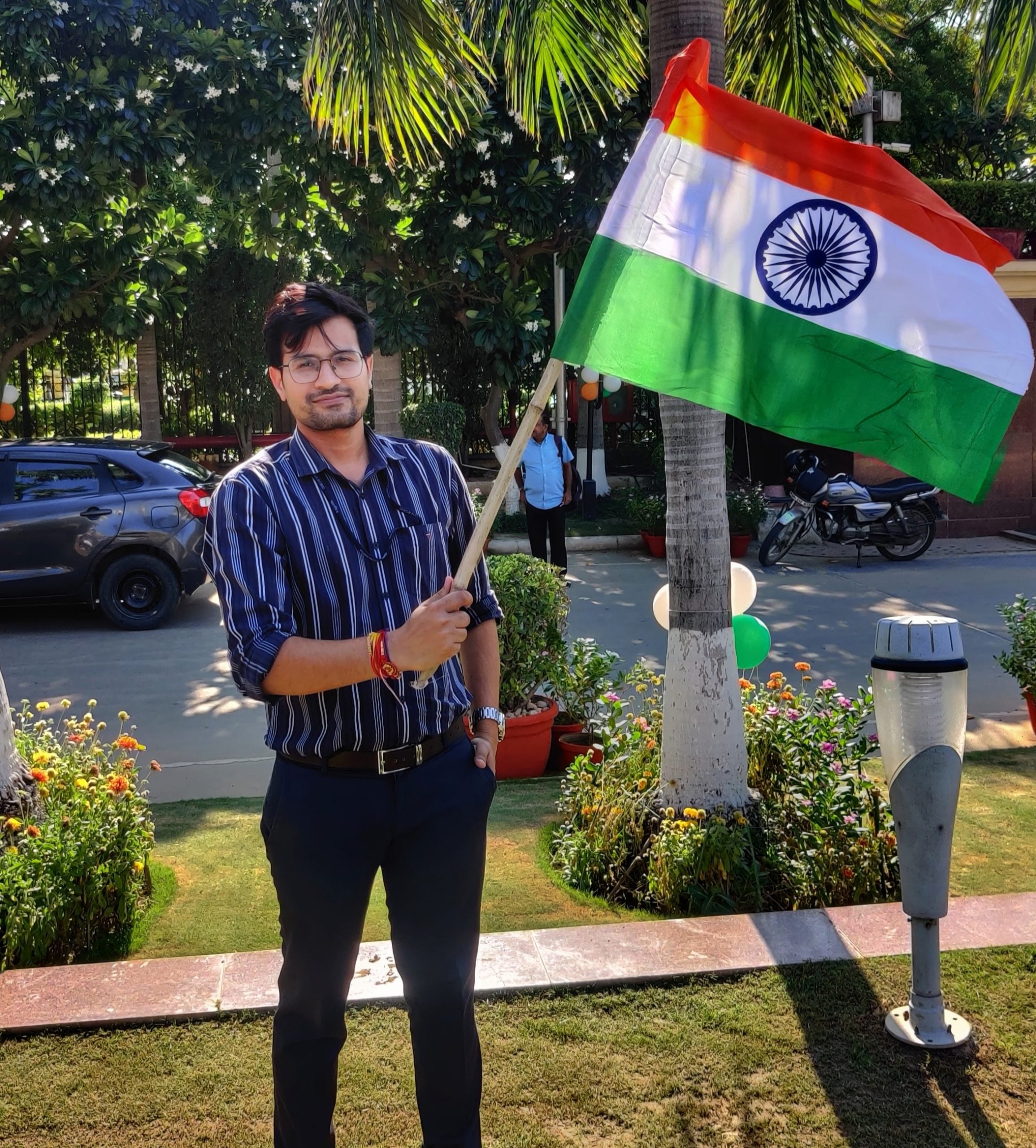This interview has been published by Namrata Singh and The SuperLawyer Team

What motivated you to choose law as a career? and how has been the journey so far for you?
Choosing law as a career has been a deeply personal and reflective decision for me. Coming from a family with three generations serving in the Forces, where they dedicated their lives to safeguarding the nation on its borders, the motivation to contribute to society was ingrained in me from a young age.
Initially, my inclination was towards humanities, driven by a desire to directly serve the community. However, societal expectations led me to pursue the science stream after my 10th standard, even though my true passion lay elsewhere. After completing my 12th standard, I mustered the courage to break away from the confines of the science stream and follow my genuine calling for law.
The decision to pursue law was rooted in its direct connection to societal issues. I wanted a career where I could witness the real-time impact of my actions on society. Law, with its profound connection to societal structures and issues, provided the ideal platform. It presented an opportunity for me to serve society actively, particularly aiding those from marginalized communities in their struggle for rights.
While my current role doesn’t involve litigation, I have found avenues to contribute significantly. By creating legal awareness and providing advice, I am able to empower individuals in my village and beyond. Moreover, my network in the legal field allows me to connect those in need to peers engaged in litigation, ensuring comprehensive support for those seeking justice.
In essence, my choice of law as a career is not just a professional pursuit but a commitment to contribute meaningfully to societal well-being, extending the legacy of service that runs deep in my family.
Your journey from Executive Trainee (Law) to Deputy Manager (Law) at Power Grid Corporation of India has been remarkable. Could you share some pivotal moments that shaped your career progression within the organization?
I appreciate your acknowledgment of my career progression at POWERGRID. My journey from Executive Trainee (Law) to Manager (Law) has indeed been marked by pivotal moments that have significantly shaped my professional trajectory.
Commencing in 2016 as an Executive Trainee (Law) based at the Western Region-1 Headquarter in Nagpur, I encountered substantial responsibilities even during the training period. One notable instance was the Arbitration Case involving M/s Indo Nabin. Despite the challenges, we were able to restrict the Arbitration award to Rs. 48 Lacs against the Claimant’s demand of Rs. 4.53 Cr. Subsequently, through effective communication with M/s Essar Power, the owner of the consultancy works, we successfully transferred the liability arising from the Arbitration Award to them, saving POWERGRID Rs. 4.53 Cr.
Following the completion of the one-year training period, I was confirmed as an Officer (Law) in 2017 and later promoted to Assistant Manager (Law) in 2018. Collaborating with my colleague Govinda Yadav, we played a pivotal role in shaping the Law Department of Western Region-1. Overseeing more than 500 cases, spanning Land Acquisition, Arbitration, IBC, Contractual Matters, and Tree & Crop Compensation Matters, we managed to significantly reduce the contingent liability of our region by over 100 crores across multiple proceedings. My responsibilities also extended to coordinating with over 20 substations and approximately 10 departments.
In 2021, I achieved a promotion to Deputy Manager (Law) and underwent a transfer to the Corporate Law Department in Gurugram. This transition provided me with the opportunity to draft crucial policies and SOPs, including those related to IBC cases, T/L works, and RoW cases. Notably, I contributed to the unique Transmission Agreement between POWERGRID and Reliance Industries Limited (RIL) for the construction of a dedicated transmission system for the Jamnagar Oil Refinery of RIL.
Furthermore, my involvement in the Africa 50-POWERGRID Project, where POWERGRID is constructing a Transmission Line in Kenya on an equity basis, marked a significant departure from previous international projects undertaken on a consultancy basis. I contributed to Project Agreements, Transmission Service Agreements, and other legal aspects of this ground-breaking initiative.
My journey at POWERGRID has been challenging yet personally satisfying, as I’ve had the opportunity to navigate complex legal scenarios and contribute meaningfully to the organization’s success.
Handling over 500 cases and 100+ contractual matters is undoubtedly challenging. Can you walk us through a particularly memorable case or project that you worked on during your tenure at Power Grid Corporation of India?
Handling over 500 cases and more than 100 contractual matters at POWERGRID has indeed presented numerous challenges, and among the many notable cases, I would like to share a particularly memorable one – the resolution of Right of Way (RoW) matters in Aurangabad.
The project in question had been stagnant for several years due to RoW issues, prompting our decision to address the matter through legal remedies. We initiated the process by filing an application under Section 16(1) of the Indian Telegraph Act, 1885, seeking the intervention of the District Magistrate for the removal of obstructions. Despite the challenges posed by the prevailing COVID situation, I undertook frequent travels and stationed myself at Aurangabad to personally follow up with the District Magistrate.
Initially, the District Magistrate displayed reluctance to issue an order in our favour, considering local factors. However, through persistent convincing and follow-up efforts, we eventually secured a favourable order from the District Magistrate. Subsequently, despite encountering hostile behaviour and resistance from the locals, with the support of the local administration, we were able to successfully construct the Transmission Line. The line was finally commissioned in 2021, just a few months before my transfer to the Corporate Center.
This project stands out as the most memorable in my career thus far, not only due to its legal intricacies but also the tangible impact it had on resolving long standing issues, facilitating the completion of the project, and contributing to the overall success of POWERGRID.
Transitioning from a legal background to pursuing an executive MBA at esteemed institutions like XLRI is quite a leap. What motivated you to pursue further education in management, and how do you envision blending your legal expertise with strategic HR leadership roles?
Embarking on an Executive MBA journey, particularly at esteemed institutions like XLRI, marks a significant transition in my career. With approximately 9-10 years of experience in the legal field, I find immense satisfaction and fulfillment in my current domain. However, my decision to pursue an Executive MBA (PGDM) from XLRI is rooted in my unwavering commitment to continuous learning.
Beyond the initial acquisition of legal skills, I recognize the paramount importance of staying abreast of industry trends and acquiring new knowledge to ensure professional relevance and adaptability. This decision aligns seamlessly with my vision of ascending to senior positions in the Public Sector. Opting for an MBA in HRM is a strategic choice, as it not only equips me for leadership roles in the future but also provides a diverse perspective on various situations.
XLRI, being a reputable institute, holds a distinguished position for imparting quality education in HRM. The decision to pursue an Executive MBA from this esteemed institution was a natural one, given my aspiration to excel in HR leadership roles. As an in-house legal counsel deeply involved in HR matters at POWERGRID, I have witnessed the synergies between legal and HR functions contributing to organizational success. By adding HR to my professional profile through an Executive MBA, I aim to enhance my capabilities and readiness for future leadership roles that may demand a holistic understanding of both legal and HR domains.
In essence, my pursuit of an Executive MBA at XLRI is a conscious effort to fortify my professional foundation, ensuring that I am well-equipped to navigate the evolving landscape of organizational leadership in the Public Sector.
Your experience at National Insurance Company Ltd. as Administrative Officer (Legal) involved managing diverse legal cases and providing risk assessment advice. How did this role contribute to your professional growth?
During my tenure at National Insurance Company Ltd. as an Administrative Officer (Legal) posted at the Baroda Regional Office, spanning approximately one year and three months, I had the privilege of managing a diverse portfolio of legal cases, significantly contributing to my professional growth.
In this role, I was tasked with monitoring and overseeing over 10,000 cases at the district level from 10 divisional Offices. I, in collaboration with my colleague Rahul Sharma and guided by our Regional Manager P.K. Sharma, also directly handled more than 200 cases before the High Court and State Consumer Forum. One noteworthy achievement during this period was successfully settling over 300 cases at the National Mega Lok Adalat, a testament to our effective legal management strategies.
This experience marked my first significant endeavour into my professional career, providing invaluable lessons that have laid the foundation for my ongoing professional growth. The exposure to a multitude of cases, the intricacies of legal proceedings, and the collaborative efforts to achieve favourable outcomes have been instrumental in shaping my understanding of legal complexities.
I am grateful to National Insurance for providing me with this opportunity, as it has been a pivotal chapter in my professional journey, instilling in me the skills and insights that continue to guide my career development.
Your academic journey includes an L.L.M. in Human Rights and a B.A. L.L.B. (Business Law Hons.), along with a certification program on Harvard Manage Mentor. How do you believe this blend of academic pursuits has shaped your approach to problem-solving and leadership?
My academic journey, comprising an L.L.M. in Human Rights, a B.A. L.L.B. (Business Law Hons.), and a certification program on Harvard Manage Mentor, has been instrumental in shaping a multifaceted approach to problem-solving and leadership.
The L.L.M. in Human Rights has honed my understanding of legal frameworks and ethical considerations, fostering a deep appreciation for the nuances of human rights issues. This has equipped me with a compassionate and holistic perspective when addressing challenges, emphasizing the importance of ethical decision-making and social responsibility.
On the other hand, the B.A. L.L.B. with a focus on Business Law Hons. has provided me with a strong foundation in commercial and corporate legal principles. This academic background has proven invaluable in approaching problem-solving from a strategic and business-oriented standpoint, ensuring that legal solutions align with broader organizational goals.
Complementing these legal degrees, the certification program on Harvard Manage Mentor has enhanced my leadership skills. From this program, I gained insights into effective management practices, strategic thinking, and leadership development. It has empowered me to navigate complex organizational landscapes, fostering a proactive and forward-thinking approach to leadership.
Together, this blend of academic pursuits has cultivated a well-rounded and adaptable problem-solving methodology. It enables me to approach challenges with a comprehensive understanding, integrating legal acumen, ethical considerations, and strategic business perspectives. This diverse academic background has been pivotal in shaping my approach to leadership, emphasizing the importance of empathy, strategic thinking, and ethical decision-making in addressing complex issues within the legal and business domains.
Your participation in moot courts, debates, and pro bono activities has been commendable. Could you share a particularly impactful pro bono experience that left a lasting impression on you?
Certainly, during my time in law school, I actively engaged in a variety of extracurricular activities such as moot courts, debate competitions, and pro bono endeavours, understanding the importance of a well-rounded legal education.
Participating in prestigious moot court competitions, including the Henry Dunant Memorial Moot Court Competition, Philip C. Jessup Memorial Moot Court Competition, Foreign Direct Investment International Arbitration Moot, and Willem C Vis Moot Court Competition, offered me a practical platform to hone essential legal skills. These experiences not only deepened my understanding of courtroom procedures but also significantly enhanced my ability to construct persuasive legal arguments, fostering critical thinking and oral advocacy skills.
Beyond the realm of moot courts and parliamentary debates, I sought to apply my legal knowledge and skills to make a positive impact on society. During an internship at Senior Advocate K.T.S. Tuli’s office, I had the opportunity to briefly contribute to the Uphaar Cinema Case, where Senior Advocate K.T.S. Tuli was handling the matter on a pro bono basis. This experience, along with my overall internship, left an indelible impression on me as a law student.
Witnessing the role of law as an agent of change in society, particularly in a pro bono context, reinforced my belief in the transformative power of legal advocacy. It underscored the notion that legal professionals have a responsibility to contribute to societal welfare by leveraging their skills for the greater good.
Your role involves drafting crucial policies, vetting high-stakes agreements, and managing diverse legal challenges for your organisation. Can you highlight some key principles or methods that guide your approach to legal terminology and research?
In the past year, my responsibilities have encompassed the drafting of crucial policies and SOPs, including those for IBC Matters, Transmission Line Works, and the Settlement of RoW Cases at POWERGRID. Additionally, my role involves the drafting and vetting of various agreements such as Consultancy Agreements, O&M Agreements, NDA, Novation Agreement, CSR MoUs/Agreements, Share Purchase Agreements, and Concession Agreements. Providing legal advisory services to management on a range of issues further adds to the complexity of my role. Throughout these tasks, my guiding principles revolve around precision and meticulousness. I emphasize clarity in legal terminology to ensure accuracy while making it comprehensible to all stakeholders. Thorough legal research remains foundational, involving a detailed examination of statutes, precedents, and industry-specific regulations. This approach ensures the robustness of my legal analyses, aligning it with the latest developments in the legal landscape. Moreover, I adopt a proactive stance, anticipating potential challenges and proactively mitigating risks. The integration of clarity, thorough research, and proactive risk management serves as the linchpin of my strategy, enabling me to provide effective legal counsel and contribute significantly to the success of the organization.
Attending various workshops, seminars, and conferences, including those on arbitration, mediation, and managerial effectiveness, demonstrates your commitment to continuous learning. How do you balance your professional responsibilities with ongoing education and development?
My approach to professional growth revolves around the belief that continuous learning and skill enhancement are pivotal elements within my control. Striving for ambitious goals necessitates a blend of hard work and smart work, and in line with this philosophy, I actively participate in various workshops, seminars, and conferences, with a focus on areas such as IBC, arbitration, Managerial Effectiveness, and Leadership. Balancing these educational pursuits with my professional responsibilities requires meticulous time management and strategic prioritization. I make a conscious effort to align chosen educational endeavors with the current needs and goals of my role, selecting programs that directly contribute to my professional growth and enhance my skill set. Furthermore, I leverage technology to participate in virtual events and online courses, allowing for flexibility without compromising the quality of learning. Regular self-assessment aids in identifying areas that require further development, guiding my selection of educational opportunities. Ultimately, this proactive and targeted approach allows me to integrate ongoing education seamlessly into my professional journey, ensuring a harmonious balance between career responsibilities and the pursuit of knowledge.
Could you share some of your favourite ways to relax and recharge outside of work?
Outside of work, I find relaxation and rejuvenation through various activities that resonate with my interests and passions. A significant part of my leisure time involves watching and playing sports, fostering a healthy balance between physical activity and recreation. Additionally, I closely follow Indian politics, harboring an aspiration to delve into election strategist akin to Prashant Kishore, a realm I find intellectually stimulating. Expressing my thoughts and perspectives, I channel my creativity into writing blogs that span a diverse range of topics, including philosophy, politics, happy living, and food.
I also consider myself a proficient cook and take pleasure in preparing delicious dishes for my family and friends, exploring different culinary experiences. The joy of travel is another aspect of my life outside work, as I enjoy exploring new places and immersing myself in diverse cultures. Lastly, my love for engaging in meaningful conversations has led me to make friends from various walks of life, providing a rich tapestry of experiences and perspectives. These activities collectively contribute to my relaxation and recharge outside the professional realm, fostering a well-rounded and fulfilling lifestyle.
As someone deeply entrenched in the legal domain, what advice would you give to the current generation aspiring to build a successful career, especially in the legal or managerial fields?
For the younger generation aspiring to forge successful careers in the legal or managerial fields, my advice is grounded in personal experiences. Firstly, believe in yourself; no dream is too ambitious if pursued with dedication and hard work. Secondly. embrace the courage to take risks, a lesson I learned with time. Regretfully, hesitating initially limited my potential for success. Taking calculated risks can open unforeseen doors.
Next, I would advise to develop a habit of active listening. It fosters effective communication and understanding, crucial in both legal and managerial domains. Moreover, persistence is key. I encourage the younger generation to persevere and learn from setbacks. In the legal and managerial arenas, tenacity often separates success from mediocrity.
Deviating from professional aspect, one personal advise I would give to younger generation is to take care of their mental health and build a supportive network of people. Seek close connections with whom they can have open conversations, receive honest advice, and feel accepted without prejudice. Imperfections are universal; find those who believe in you as you are.
In summary, believe in your capabilities, embrace risks, cultivate active listening, gain practical experience through internships, persist in the face of challenges, and prioritize mental well-being through a supportive network. These principles have guided my journey, and I believe they can pave the way for a successful and fulfilling career for the aspiring generation.
Get in touch with Sachin Yadav-


























